When was the last time you had a cup of tea? If you can’t remember you’ve probably been too busy, as a new survey from Vistaprint says that those who work in retail have time for just eight cups of tea a week. At the other end of the scale, plumbers drink three to four cups a day! And tea rounds are a major bone of contention with 25% of the 2,000 workers surveyed, who say they have at least one tea-related row a week.
86%
That’s the percentage of UK households who have purchased coffee in the past year (Kantar Worldpanel)
Arguments over tea could well hot up as both PG Tips and Tetley are running major on-pack promotions, and shoppers will need to decide how they want to be rewarded for their loyalty.
In the PG corner, there’s the Cuppa Club where consumers can collect PG Points from beneath the lid of 28 million promotional and premium packs. They then join the PG Tips Cuppa Club online to redeem their points against tea treats such as ‘2 for 1’ afternoon tea experiences and Oliver Bonas teaware.
Over at Tetley, consumers are being encouraged to ‘Find Sydney’. Ten million promotional packs are in circulation with a £1,000 instant-win prize up for grabs in return for finding a ‘Find Sydney’ token inside a pack. Fifty tokens will be in circulation during the promotion, and prizes can be redeemed until March 31, 2014.
Special packs also feature a second opportunity to win using a code printed on them which, when entered online, gives shoppers the chance to win prizes from £1 money-off tokens to £1,000 cash.
You can applaud both companies for having a go because brand loyalty or otherwise, there’s no getting away from the fact that the tea category is in decline. Unfortunately, a lot of younger consumers are drinking more soft drinks or opting for the sophisticated image of a skinny latte or Americana rather than a cup of old-fashioned builder’s (or plumber’s) tea. Yes, more people are drinking green and herbal teas, but ‘black tea’ still accounts for 90% of volume sales.
Retailer’s view
“We have 2m of space for hot beverages right at the front of the shop. There are six shelves with sugar on the bottom.
“To be honest, it’s not a very exciting category for us; I think it works better for stores with offices nearby. However, we have to stock hot beverages. We go for the big brands as well as a few more upmarket lines. We’ve tried introducing herbal teas, but they’re not selling particularly well because people don’t expect to find them in our store.
“There are continuous promotions on coffee and tea with extra-value packs or pricemarking and my customers expect us to have them. The big problem for us is pricing; we need more parity with the big supermarkets. Tea and coffee are ongoing purchases so shoppers know the prices. Once a product’s on promotion it soon shifts.”
Ben Patel, Londis, Minster, Kent
PG Tips brand manager Kate Mitchell admits that the Cuppa Club campaign is in direct response to the decline in tea sales. “By placing emphasis on encouraging consumer loyalty through our loyalty scheme, we’re giving consumers a reason to buy tea at full price and driving rate of purchase - ultimately resulting in incremental sales for the category.
“We anticipate that the PG Tips Cuppa Club campaign will drive additional loyalty from existing tea drinkers and increase consumption and frequency of purchase. As such, the campaign is focused on delivering long-term category growth and can be considered an example of PG Tips’ continued leadership of the category.”
Hopefully, this activity will bring a well-needed boost to the traditional British cuppa. Valued at £630m (Nielsen), the tea sector can be described as ‘flat’ at best, with 0% growth.
Taylors of Harrogate convenience channel controller John Sutcliffe says the standard black tea bag category is in volume decline (-0.8%) and c-store sales are declining faster than that, at a worrying -7.8%. “This is mainly driven by consumers switching into other tea sectors such as herb, green and speciality,” he explains.
“The market has seen a huge switch in the tea category away from the multiples and into the discounters (Aldi, Lidl and so on). This is due to it being a highly promoted sector with more than 70% of volume sold on deal. C-store retailers therefore have the challenge of encouraging their customers to pick up an item from the hot beverage fixture as part of a top-up shop.”
Taylors offers pricemarked packs for all of its tea products, which Sutcliffe says helps to drive sales and create price visibility for the customer.
“Round pound promotions help to drive trial into the tea and coffee category, however customers are confused if they see everything on promotion at the same time in a c-store. We therefore encourage retailers to promote one or two products from both tea and coffee and alternate the offering every two to three weeks to retain customer interest.”
Tetley’s director of shopper and customer marketing Andrew Pearl believes our ageing popular could benefit tea sales.
“Currently, the 45-plus age group drinks more tea than any other group. As these loyal drinkers age, the appeal of healthier black teas such as Tetley decaf increases and we are seeing this benefit sales of decaf teas overall.”
However, he says the impulse sector has been slow to grab the decaf opportunity, with low distribution and accounting for just 2.4% of tea sales compared with more than 5% in the rest of the market (Nielsen).
Hot Bev Health-Check
- Look at how each line is performing. What is the penetration of the fixture in store? Are items only selling on promotion, and are you stocking lines which represent market growth and cover each sector (herb tea, fruit tea, speciality and so on)?
- Encourage customers to do their hot beverage shopping in your c-store by creating cross-sector promotions - such as encouraging them to pick up a tea and coffee item as part of the same purchase
- Cover a ‘good, better, best’ strategy
- Try not to over-promote the category. Create interest by alternating one or two promotions per sector every two to three weeks to keep it fresh and interesting
- Review the range every three months
- Follow our hot beverage planogram health-check advice by visiting www.conveniencestore.co.uk. Look for ‘category management’ under the ‘advice’ tab for insight from Yorkshire Tea.
Another big opportunity, according to Pearl, is green tea and Tetley Green pure 20s and Green lemon 20s have been developed specifically for the c-store sector. These are pricemarked at £1 and come in outers of four so are relatively low risk to stock.
But green tea could be described as being an ‘acquired taste’. And for people who don’t like that taste, Tetley has the answer - Tetley Blend of Both, which tastes like regular tea but does contain green tea so has its benefits, such as containing powerful antioxidants.
Pearl believes a lot more work needs to go into promoting the benefits of different teas. “Activity such as sampling could bring a lot of engagement and excitement to the tea fixture,” he says. “The simple use of POS to explain the benefits so the shopper understands them would also work well. We’re currently working with convenience retailers to find the best possible solutions, to see what works best at driving interest.”
Full of beans
Tea might not be lighting up c-store sales charts, but the sector is doing well with coffee - with growth at 7.4% (SIG data, 52 weeks ending June 2013) compared with the total market growth of 5%, which takes the market to £982m.
But the majority of the c-store sector’s growth is from the convenience multiples. Douwe Egberts marketing director for UK and Ireland Corrine Hopwood says this is because they provide more space in store to the coffee segments that drive category growth and match customers’ needs more closely.
She adds: “The challenge in coffee for symbols and independents is to recognise which segments are driving growth and to tailor product ranges more closely to reflect this.
“In the total coffee market and the convenience multiples within the latest year, the freeze-dried segment was the main contributor to annual spend growth (SIG). This encapsulates the premiumisation trend in the category as shoppers and consumers increasingly want a quality tasting coffee product.
“Unfortunately, within symbols and independents, freeze-dried has a lower share of spend and there’s more of a focus on granulated coffee. However, granulated coffee significantly over-trades as a percentage of spend in symbols and independents compared with the total market. So retailers need to range the key freeze-dried brands and provide more space for them in store to unlock an increase in coffee basket spend and provide customers with what they want.”
She says, therefore, that Douwe Egberts’ Freeze Dried is a must stock for c-stores. She also recommends “tiering” the instant coffee fixture by the different segments to communicate the different value proposition that each sub-segment offers the shopper. “This can translate the instant fixture to match the different need states that instant shoppers have. For example, a ‘quick quench’ instant shopper may purchase a lower-priced offering where caffeine is the main benefit they’re after. However, an instants shopper whose need state is ‘take a break’ could be willing to purchase a higher-priced coffee as it can be seen as an indulgent treat.”
Hopwood says ground packs should be displayed by strength. “This means placing the lowest numbered strength flavour on the left-hand side of the shelf, then moving up to the higher strengths towards the end of the fixture.
“Stock ground products which have clear strength indicators on their packs to help the shopper navigate the fixture. This will reduce the shoppers purchase risk, avoid the shopper being confused and increase their propensity to purchase.”
Freeze-dried and ground coffees may well be worth stocking, but there’s no disputing the continued popularity of mainstays such as Nescafé and Nescafé Gold Blend. The latter has seen sales growth of 9.6% in the past 12 months (SIG data) thanks, according to Nestlé UK trade communications manager Graham Walker, to its “fantastic value and great taste”. And he says the Nescafé original 100g pricemarked jar helps make clear the value on offer in c-stores so is a vital SKU for the sector.
But even in instants there’s room for coffee-shop quality bevvies. Walker says barista-style instant Nescafé Azera has performed particularly well in convenience stores and currently accounts for £1 in every £2 spent on super-premium products. The growing consumer demand for coffee-shop quality beverages that can be prepared at home is also demonstrated by the uplift in sales of Nescafé Café Menu, which comes in latte, cappuccino and mocha varieties. Over the past year, sales have increased by 15% (SIG).
Every brand owner nowadays has to be aware of its products’ impact on the environment. It’s even better if a product offers a ‘win, win’ by doing its bit environmentally and, at the same time, making retailers more money. According to Nielsen data, instant coffee refills are experiencing much stronger growth than jars and therefore provide a real opportunity for retailers.
Mondelēz International trade communications manager Susan Nash says key products for convenience retailers include Kenco Smooth 100g refill, Kenco Rich 100g refill, Kenco Decaff 100g refill and Kenco Millicano 85g refill.
“Kenco Eco Refill packs have 97% less packaging weight than Kenco jars per gram of coffee, making them a great way to reduce packaging waste and lighter for shoppers to carry home following a trip to the local convenience store. In addition, the rrp of the refills is less per gram of coffee than the rrp of either 100g or 200g jars, helping customers to save money at a time when budgets are tight.”
Finally, you could create a buzz around your hot bevs by getting involved in Macmillan Cancer Support’s World’s Biggest Coffee Morning. The official date for this year’s event is Friday, September 27, but you don’t have to hold a coffee morning on that day; you can do it whenever you like.
Or, if you think a coffee morning is not for you, you could show your support in other ways by perhaps supporting another local coffee morning.
The Kenco brand is supporting the activity for the fourth year running. Log onto www.kenco.co.uk to find out all about it. There’s also a chance to win an ‘Ultimate Coffee Morning hamper’, which contains items to help you raise even more money including an Eco kettle, a coffee mug set, a cupcake maker, and Kenco coffee.
Think about it… you could boost your coffee sales and, at the same time, support a worthy cause.
Ones to watch
Pregnancy boost
PG Tips Decaf is benefiting from a £1m marketing investment in 2013. The brand continues to sponsor Bounty pregnancy packs, putting the decaf tea in front of a key consumer segment - pregnant 25- to 32-year-old women. Prices range from £1.64 for 125g, to £5.26 for 500g.
tel: 01293 648000
Extra Wispas
A whopping 78% of Wispa hot chocolate volume sales have been incremental to the category since launch earlier this year. The Fairtrade chocolate drink has also brought younger shoppers into the market, according to Kantar data.
rrp: 38p for the 27g sachet; £2.79 for the 246g jar.
tel: 01242 236101
Birthday brand
Nescafé original is celebrating its 75th anniversary this year, which it is supporting with a marketing campaign that will run across a variety of formats including TV, radio, online and in print. The brand currently sponsors Magic 105.4FM’s breakfast show, hosted by DJ Neil Fox.
tel: 020 8686 333
Bags of value
Typhoo is targeting bargain-hunters with its Typhoo 80s +50% extra-free, offering shoppers 120 teabags for less than £2. The company says the bright blue 50% extra-free message on pack is eye-catching and the pricemarked £1.95 flash helps to reinforce customers’ perception of value in store.
tel: 0151 522 4022
Triple winner
Tempting coffee connoisseurs looking for a morning pick-me-up or after- dinner treat, Nescafé has added three new varieties of coffee to the Nescafé Azera range: latte; cappuccino; and intenso. Nestlé, owner of the £11m-a-year brand, reports that early sales of the new varieties are strong.
tel: 020 8686 333





















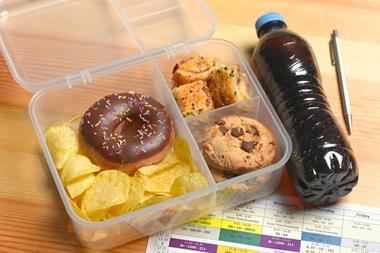
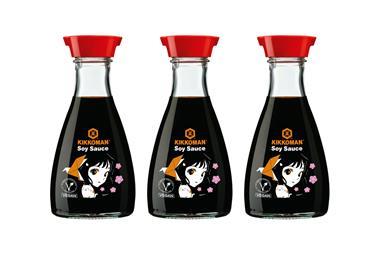
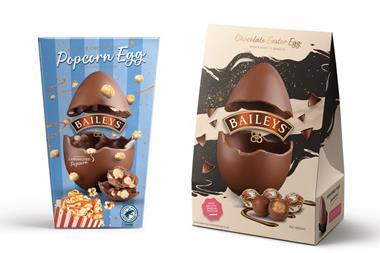
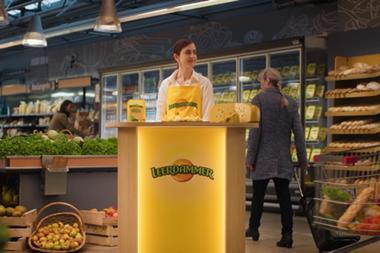
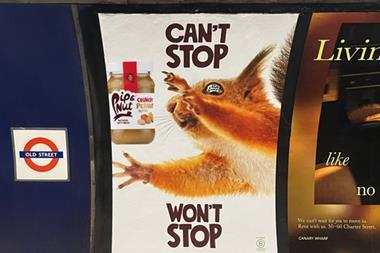
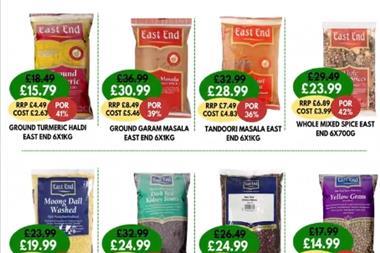
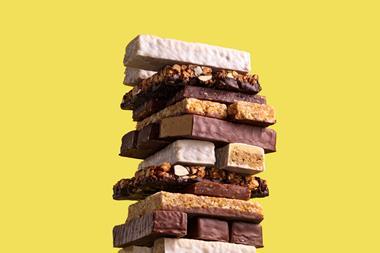

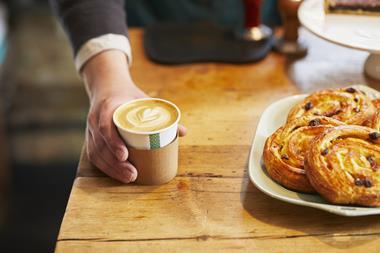
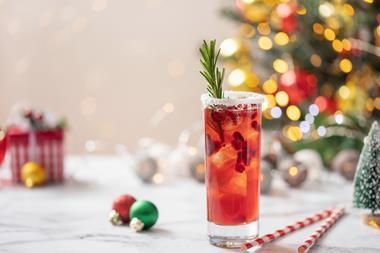


No comments yet